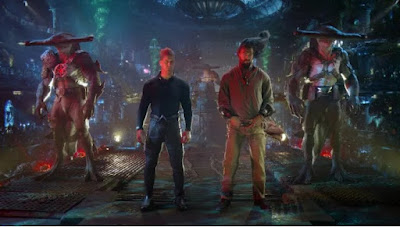New student Cady Heron gets welcomed into the top of the social food chain by an elite group of popular girls called the Plastics, ruled by the conniving queen bee Regina George. However, when Cady makes the major misstep of falling for Regina's ex-boyfriend, she soon finds herself caught in their crosshairs.
Mean Girls (2024) brings a familiar tale to the screen, blending the essence of the original film with a musical twist. Directed by Samantha Jayne and Arturo Perez Jr., with Tina Fey returning as the writer, the movie introduces some noteworthy changes to the classic storyline. Despite some shortcomings, the film manages to offer an entertaining experience, thanks in no small part to the standout performance of Reneé Rapp.
The plot remains faithful to its predecessor, following Cady, played by Angourie Rice, as she navigates the treacherous waters of North Shore High School. The screenplay, almost identical to the original, still captivates audiences with its timeless narrative. The inclusion of mediocre musical numbers, however, becomes a focal point of discussion, casting a shadow on an otherwise engaging storyline.
One notable evolution in Mean Girls is the diverse cast, reflecting a shift away from outdated expectations for actresses. The characters, particularly Janis and Regina, exhibit new facets, presenting a more modern perspective on femininity and sexuality. Janis, now more stereotypically feminine, and Regina, portrayed by Reneé Rapp, who brings a seductive and louche quality to the role, contribute to the film's unique charm.
The film's visual appeal is heightened by the excellent choreography of dance numbers by Kyle Hanagami. Cinematographer Bill Kirstein and editor Andrew Marcus collaborate seamlessly to blend musical sequences with montage storytelling, creating an engaging viewing experience. While the songs by Jeff Richmond and Nell Benjamin are witty and energetic, their impact is somewhat diluted by excessive visual and audio augmentation, making it challenging to connect with the characters and story.
One of the movie's standout features is the performance of Reneé Rapp as Regina. Her portrayal, while different from Rachel McAdams' iconic interpretation, brings a new dimension to the character. Rapp's powerful R&B-influenced vocals infuse songs like "World Burn" and "Someone Gets Hurt" with undeniable charisma. Her presence on screen exudes confidence, making her a standout element in the film.
Despite the film's attempt to refresh the source material for a new generation, Mean Girls struggles to resonate with the evolving landscape of teenage culture. The mean-spiritedness lacks the sharpness and authenticity that characterized the original, leaving audiences questioning the film's identity. The age-old narrative arc of the "Burn Book" feels out of place in the era of social media, highlighting a disconnect with the current realities of adolescent behaviour.
The film does have its merits, with a nod to Regina's sidekicks, Karen and Gretchen, portrayed by Avantika and Bebe Wood. Their characters, showing a bit more soulfulness, add depth to the narrative. Auliʻi Cravalho, known for voicing Moana, delivers an impressive vocal performance as Janis, contributing to the overall musical richness of the film.
Mean Girls may not fully capture the biting wit and cultural relevance of its predecessor, but it offers a lively and nostalgia-ridden remake. The movie succeeds in paying homage to the original while introducing some modern twists. If approached with moderate expectations and an appreciation for Reneé Rapp's captivating performance, audiences are likely to find enjoyment in this updated take on the high school classic.
As times have changed, Mean Girls might not have kept up entirely, but it still manages to deliver a fun and entertaining cinematic experience, fit for a teenage audience.
Mean Girls is in NZ cinemas from January 18, 2023










